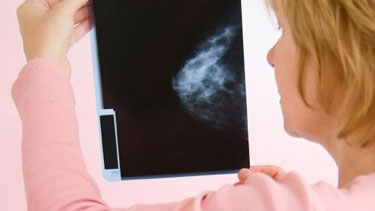The Accidental Breast Cancer Patient
After a revolving door of mammograms, cancer medication and lumpectomies, one woman wonders if early screening is the best method of preventing breast cancer.

My 40s have been haunted by mammograms. This may sound ungrateful, considering I'm a breast cancer survivor whose cancer wouldn't have been discovered without them. But my breast history is as complicated and inconclusive as the debate over the new screening recommendations. So I'll just say it: I'm not sure if early screening was a good thing for me.
I entered my 40s an ox: strong, invincible. I practiced yoga, kayaked, rarely got sick. So when I went in for my annual mammogram, at 41, I was shocked to be told that my films looked "suspicious." I had no risk factors. No cancer of any type in my family. I had my first baby at 28. But none of that mattered. Next thing I knew, I was strapped to a surgical bed for a biopsy. The verdict: benign. I had something called atypical hyperplasia, an accumulation of abnormal cells that could be precancerous—or not.
After two weeks on the couch, my chest wrapped in gauze, I was left with a small scar, a bruised psyche, and chronic fear. I was now on the close-watch plan, which required mammograms every six months, as well as callbacks for additional examinations. This increased scrutiny was considered a good thing, and I tried to see it that way, but honestly, I dreaded the appointments, those extra films, the anxious waiting.
At 43, that scrutiny found "suspicious" calcifications. Again, no lump—just a tiny cluster of white, seen only by mammogram. This time I had a core biopsy, which entailed being smashed facedown on a surgical bed, my right breast squished into a hole while a long needle went fishing for cells.
Again, benign.
But I continued on close watch. More paper gowns. More films. More fear.
At 45, the mammogram again showed tiny calcifications. And again, I found myself strapped to a surgical bed—this time for a lumpectomy.
Get exclusive access to fashion and beauty trends, hot-off-the-press celebrity news, and more.
The pathology came back: ductal carcinoma in situ (DCIS), cancerous cells in the milk duct. I was spared radiation and chemotherapy and was prescribed tamoxifen—an antiestrogen with a long list of side effects, including insomnia, hot flashes, and possible increased risk of uterine cancer and heart disease. A recent study also suggested that it may increase risks for hormone-negative cancers, a more aggressive form compared to the hormone-positive cancer that I was thought to have. To complicate matters, a Mayo Clinic pathologist I later consulted believed that my DCIS was actually another case of atypical hyperplasia. Benign.
So did I need all those tests? All that treatment?
I wish I had a definitive answer. The confusion brings up an uncomfortable truth about medicine: Recommendations are based on population studies, not individual cases. My heart goes out to every woman saved by early diagnosis, but, as breast expert Dr. Susan Love has said, screening before 50 is tricky: Younger women have dense breast tissue; it looks white on a mammogram, and so does cancer—it's like "looking for a polar bear in the snow." Tumors are missed, and non-tumors are biopsied. Worse, Love says, "The risk of radiation is higher in younger women and cumulative. Additional cancers caused by the radiation have to be weighed against the ones found."
For every one in 1,900 women who is saved by early detection, how many women are harmed? Will I be harmed? This we do not know.
What showed up in my mammograms may have been an overreaction to my body's changing hormone levels. It's possible that if I had waited for my first mammogram at 50, they would have resolved on their own. Autopsies on women in their 80s and 90s have found DCIS that likely existed for decades and never spread.
Did the cells excavated from my core biopsy at 43—and all those mammograms—actually cause the DCIS? Or would those "suspicious" white spots, left undetected and untreated, have eventually grown into an invasive cancer—and killed me? I don't know. Doctors don't know.
What I do know is that it's up to me to treat my body with the utmost love and respect. So I feed it organic foods and sweat every day—do hot yoga, have sex, run marathons. Anything to make my heart race and skin flush. Anything to make me forget the breast cancer diagnosis and all those mammograms.
Gail Konop Baker is the author of Cancer Is a Bitch.